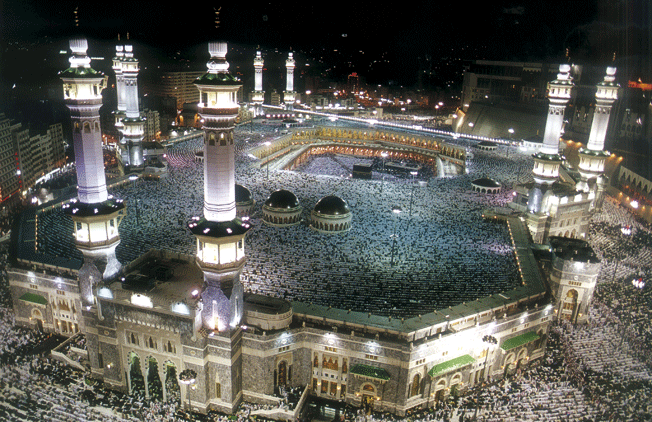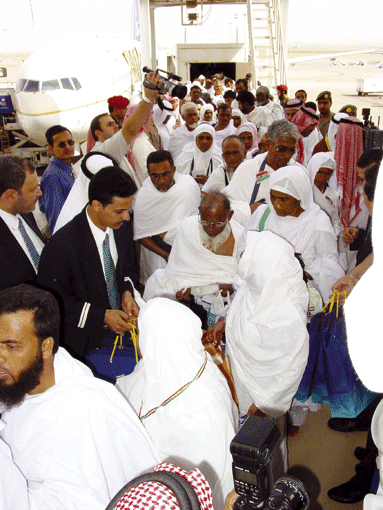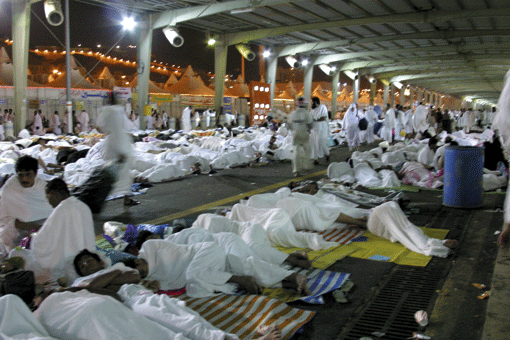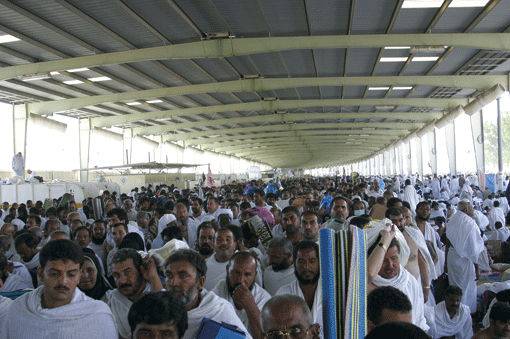
Health
Hajj Season 1430 H, 2009
Health Precautions for Pilgrims

The Ministry of Health of Saudi Arabia has requested all those coming for Hajj from all around the world
to be vaccinated against the pandemic (H1N1) 2009 influenza if the vaccine becomes universally available,
but they recognize that this is unlikely to apply for this year’s pilgrimage.
By: Dr. Ihab Khattaby*
The Hajj (pilgrimage) rituals occur from 8th till 12th day of the 12th month of the Islamic calendar, and is likely to be between 25 and 29 November 2009. The Saudi Ministry of Health and the World Health Organization (WHO) advise the elderly, children, pregnant women and patients with chronic diseases to postpone their participation in Hajj and Umrah this year due to the risk of contracting the pandemic influenza during the pilgrimage.
Vaccination Advice
The following vaccine-preventable diseases have particular relevance to Hajj and Umrah pilgrims.
Seasonal influenza: The Saudi Ministry of Health requires all pilgrims performing Hajj to have received vaccination against the 2009-2010 seasonal influenza at least two weeks before applying for a visa. Proof of vaccination is required in order to obtain a visa and no exceptions will be allowed. A written record of vaccination, authorized with the vaccinator’s official stamp, should be provided. If a traveler is in possession of an International Certificate of Vaccination or Prophylaxis (ICVP) booklet, seasonal influenza vaccine can be recorded in the ‘Other Vaccinations’ pages of the booklet. Travelers should, as well, be aware that vaccination against seasonal influenza may not protect them against the virus.
Influenza is transmitted via the respiratory route and is easily transmitted in crowded conditions. Certain groups are at particular risk of complications from influenza including those aged 65 and older, and those with pre-existing medical conditions such as chest, heart, liver, spleen and kidney conditions, or diabetes. Travelers who fall into any of these categories should receive influenza vaccine annually from their usual healthcare provider, but should also adhere to the advice of postponing their pilgrimage this year. For those who do not fall within any of these categories, vaccine can be purchased and administered at high street chemists, other retailers or private travel clinics, but even they might like to consider the public advice heeded to those with ailments.
Viral respiratory infection (known as Hajj cough) experienced by many pilgrims during the Hajj season, can range from a mild inconvenience to a severe illness, and can interfere with performing the rites. Simple precautions such as use of tissue to cover coughs and sneezes, safe disposal of the tissue, and hand washing will help reduce the spread of respiratory infection. The use of face masks during public events such as the Hajj is not recommended.
Pandemic (H1N1) 2009 influenza (Swine Flu): Pandemic influenza has occurred throughout the world, including Saudi Arabia. Although symptoms of pandemic influenza have been mild in most people, certain groups are at an increased risk of severe diseases (see above) and should heed the advice to postpone their pilgrimage this year.
There is screening of passengers on arrival at all ports in Saudi Arabia, and if persons are suspected of having pandemic influenza, they will be temporarily quarantined and admitted to hospital for further testing.
The Ministry of Health of Saudi Arabia has requested all those coming for Hajj from all around the world to be vaccinated against the pandemic (H1N1) 2009 influenza if the vaccine becomes universally available, but they recognize that this is unlikely to apply for this year’s pilgrimage.
Meningococcal meningitis: All pilgrims wishing to obtain a Hajj and Umrah visa are required to show proof of vaccination against meningococcal meningitis ACW135Y. The vaccine should be within the required period of no more than three years and not less than 10 days before arrival in Saudi Arabia, and should be recorded in a vaccination book showing the traveler’s full name. 
Meningococcal meningitis occurred during previous pilgrimages and spread to other countries in association with returning pilgrims. Therefore, vaccination is also advised for personal protection.
Chemoprophylaxis against meningococcal infection will also be given to all arrivals from countries in the African meningitis belt to lower the meningitis carrier rate among them. The Saudi Ministry of Health has specified these countries: Benin, Burkina Faso, Cameroon, Central African Republic, Chad, Côte d’Ivoire, Eritrea, Ethiopia, Gambia, Guinea, Guinea-Bissau, Mali, Niger, Nigeria, Senegal, and Sudan.
Polio: All pilgrims to Hajj and Umrah should ensure their polio vaccination is up-to-date. Travelers, whose last dose of polio was more than 10 years ago, should make sure to receive a booster, using the trivalent tetanus, diphtheria and polio vaccine.
The Saudi Health Ministry also recommends that all travelers arriving from Afghanistan, India, Nigeria, Pakistan and Sudan, regardless of age and vaccination history, receive one dose of oral polio vaccine (OPV) six weeks prior to departure for Saudi Arabia. All such travelers will be required to receive a further dose of OPV upon their arrival in Saudi Arabia.
The Saudi Ministry of Health recommends that all travelers aged less than 15 years from countries with on-going or recent transmission of imported wild polio virus, show proof of vaccination with oral polio vaccine six weeks prior to visa application. Irrespective of vaccination history, these travelers will be required to receive a further dose of OPV on arrival in Saudi Arabia. The Ministry of Health considers the following countries to have on-going transmission of wild polio virus: Angola, Benin, Burkina Faso, Central African Republic, Chad, Côte d’Ivoire, Democratic Republic of the Congo, Ethiopia, Ghana, Kenya, Mali, Nepal, Niger, Togo, and Uganda.
Hepatitis B: Hepatitis B virus is found in body fluids and can be transmitted either percutaneously or by sexual contact. Percutaneous transmission occurs through the use of contaminated medical, dental, or other instruments; all pilgrims must have a hepatitis B vaccine.
One of the rites of Hajj is for men to have their head shaved. The Saudi authorities provide licensed barbers with a new blade to use for each pilgrim, however, unlicensed barbers may not conform to such standards. Pilgrims should avoid shaving with a blade previously used by another, as this could carry a risk of hepatitis B and other blood borne infections such as hepatitis C for which there is no vaccine. Pilgrims might like to consider taking with them a disposable razor for personal use during this rite.
Yellow fever: All pilgrims to Hajj and Umrah arriving from countries or areas at risk of yellow fever transmission must present a valid ICVP documenting yellow fever vaccination completed in accordance with International Health Regulations (2005).
Food and Water Advice
Diarrhoeal illnesses are transmitted by the consumption of contaminated food or water. Dehydration can occur as a result of diarrhoea and is of particular risk in hot weather. Babies, infants, the elderly and those with chronic medical conditions are vulnerable to dehydration.
All pilgrims to Hajj and Umrah are advised to take food and water hygiene precautions.
In addition, travelers should be advised to carry oral rehydration therapy and self-treatment for diarrhea. An anti-motility agent such as loperamide can be carried and an antibiotic considered, especially for those travelers who have an underlying medical condition. Ciprofloxacin (500mg twice daily for up to three days) in the absence of contraindications is generally the drug of choice.
Vector-borne Diseases
Malaria is not present in Medina or Makkah, but malaria is a risk in the south-western region and rural areas of Saudi Arabia. Pilgrims planning further travel before or after Hajj or Umrah to malaria risk countries in Asia, Africa and Latin America, should seek advice about malaria prevention.
Pilgrims are advised to practice insect bite avoidance measures that will reduce the risk of other vector-borne diseases, such as dengue fever.
Heat and Sun-related Hazards
Daytime temperatures in Saudi Arabia, even during the winter months, can reach over 30°C. Associated risks include sunburn, dehydration, heat exhaustion, and heat stroke.
If at all possible, travel before the start of Hajj should be considered in order to allow a period of acclimatization to the heat. Pilgrims should ensure to drink plenty of clean water (preferably bottled or boiled) to avoid dehydration.
Sunscreen with a sun protection factor of at least 15 to 30 should be applied liberally to exposed skin every two to three hours. Male pilgrims are not allowed to cover their heads; however an umbrella does provide shade from the sun. 
Desert sand can reach very high temperatures; good quality footwear should be worn to avoid burning the feet. Footwear must be removed during times of prayer, and to avoid losing them, pilgrims are advised to carry their footwear in a bag.
Accidents and Injuries
Minor injuries are relatively common, particularly to the feet. More serious injuries can occur as a result of stampedes as pilgrims undertake the stoning rite or other mass activities. Pilgrims are advised to avoid peak times, while elderly and infirm persons may wish to consider appointing a proxy for the performance of this rite.
Other Health Advice
Physical fitness: Performing the rituals of Hajj is demanding and involves walking great distances usually in hot weather. Pilgrims should ensure that they are physically fit before traveling.
Menstruation: Women who anticipate their periods falling during the Hajj may wish to delay menstruation, which is possible to achieve using hormonal treatment. Women are advised to discuss this with their GP or family planning clinic well before departure.
Medical kits: All pilgrims should take a basic medical kit with them, which should include simple analgesia (pain killers), plasters, anti-motility medication such as loperamide, and oral rehydration treatment. Pilgrims who take regular medication should ensure they have an adequate supply and carry a copy of their prescription.
Insurance: All pilgrims to Hajj and Umrah should ensure that they have adequate travel health insurance.
Pilgrims should carry with them their GP’s details which may be required should emergency medical care be necessary.
Saudi Arabia will undertake screening for selected communicable diseases at points of entry and may take additional precautionary measures.
* Family doctor, Specialized Medical Center, Riyadh